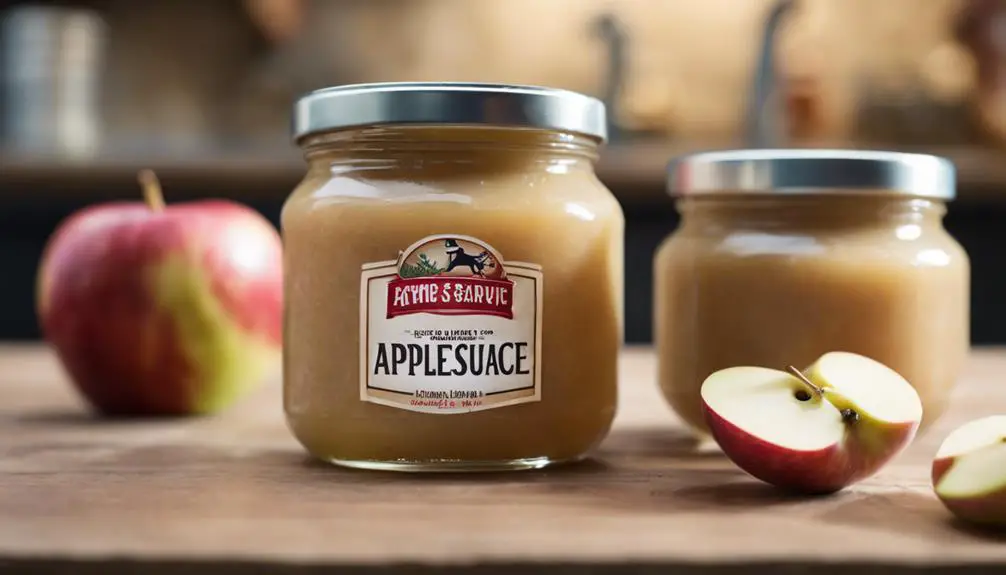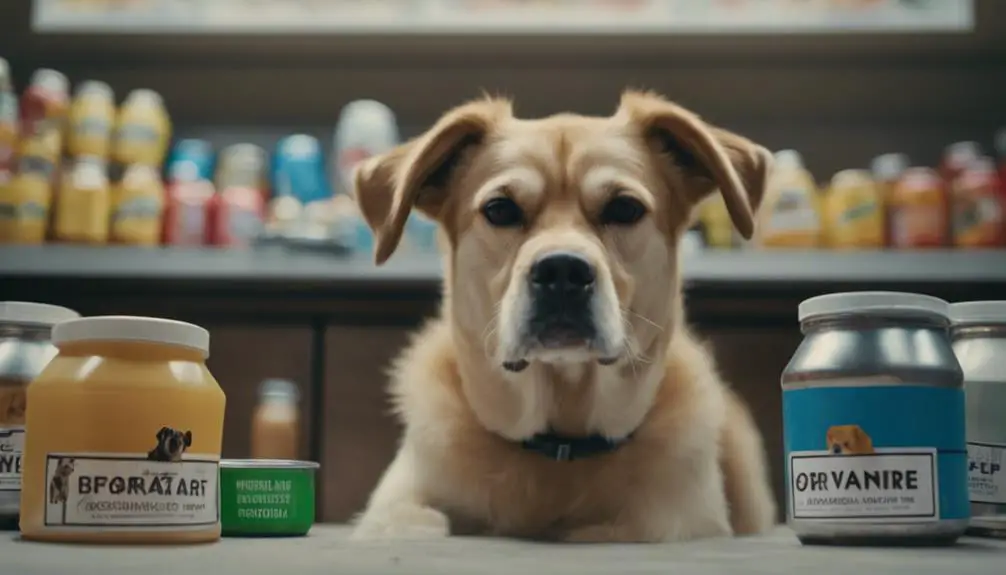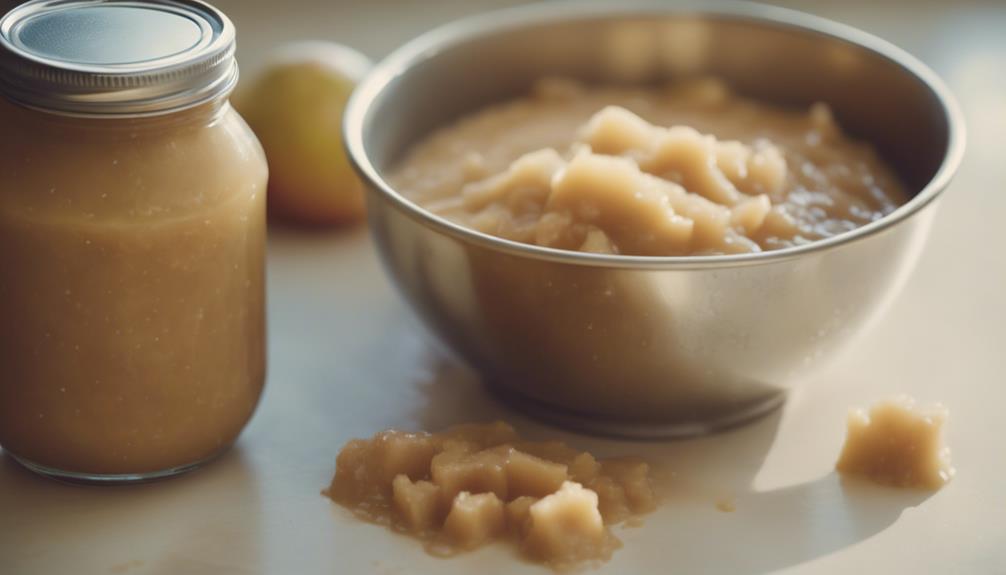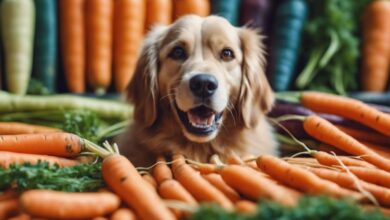How Much Applesauce Can a Dog Eat
I'd recommend giving your dog applesauce in moderation to avoid potential digestive issues. Start with small amounts to test their reaction. Generally, it's best to limit applesauce due to the sugar content and potential health concerns, especially for diabetic or overweight dogs. Consider consulting with a vet for personalized advice on serving size and frequency to guarantee your dog's well-being. Remember, a balanced diet is key for your furry friend's health. Understanding the benefits, risks, and recommended portions will help you make informed choices for your dog's diet.
Key Takeaways
- Consider dog's size and dietary needs for appropriate serving size.
- Monitor dog for allergic reactions, digestive issues, or overindulgence.
- Start with small amounts, observe reactions, and adjust servings accordingly.
- Consult vet for guidance on portion control and frequency of feeding.
- Homemade applesauce is a healthier option due to control over ingredients and additives.
Benefits of Applesauce for Dogs

When contemplating the benefits of applesauce for dogs, it is essential to grasp its potential nutritional advantages and health implications. Applesauce can serve as a useful tool in training treats due to its convenient form and dogs' general appreciation for its flavor. As dogs have varying flavor preferences, applesauce can be a versatile option to cater to individual tastes. Additionally, incorporating applesauce into a dog's diet can provide health benefits such as essential vitamins, fiber, and antioxidants. It can aid in digestion and contribute to overall well-being when consumed in moderation and as part of a balanced diet.
In terms of portion control, applesauce can be a valuable addition to a dog's meal plan, offering a low-calorie alternative to traditional treats. It allows for easy monitoring of calorie intake, especially for dogs requiring weight management. However, it is important to take into account the sugar content in some commercially available applesauces, as excessive sugar consumption can lead to health issues. When feeding dogs applesauce, moderation and selecting options with minimal added sugars are key to reaping its benefits without adverse effects.
Risks of Feeding Applesauce
Feeding your dog applesauce can potentially lead to digestive issues like diarrhea or upset stomach due to its high fiber content. Additionally, the sugar content in applesauce can be a concern, especially for dogs with diabetes or weight issues. It's important to monitor your dog's reaction to applesauce and consult with your veterinarian before making it a regular part of their diet.
Potential Digestive Issues
In my experience, monitoring is crucial when it comes to overfeeding applesauce to a dog as it can potentially lead to digestive issues. Dogs, like humans, can have dietary sensitivities that may upset their digestive health. Monitoring for any potential allergies and practicing portion control when introducing new foods like applesauce is important. Here is a table outlining potential digestive issues related to feeding applesauce to dogs:
| Digestive Issue | Symptoms | Treatment |
|---|---|---|
| Upset stomach | Vomiting, diarrhea | Withhold food, offer water |
| Gas and bloating | Abdominal discomfort | Gentle exercise |
| Pancreatitis | Lethargy, loss of appetite | Veterinary care |
| Constipation | Straining to defecate | Increase water intake |
| Diarrhea | Loose stools | Bland diet, probiotics |
Sugar Content Concerns
Concerns regarding the sugar content in applesauce arise when considering the potential risks associated with feeding this treat to dogs. While applesauce can be a tasty snack, it's important to be aware of the sugar intake it brings. Excessive sugar consumption can lead to various health implications for dogs, including obesity, diabetes, dental issues, and gastrointestinal problems. Dogs have different digestive systems from humans, making it harder for them to process high levels of sugar efficiently. Even small amounts of applesauce, especially those containing added sugars or artificial sweeteners, can contribute to weight gain and other health issues over time. Monitoring your dog's sugar intake, including from applesauce, is essential for maintaining their overall well-being and preventing potential health risks.
Recommended Serving Size

When determining the recommended serving size of applesauce for your dog, it is important to take into account their size and dietary needs. Serving frequency and portion control are key factors to take into consideration. For smaller dogs, a teaspoon of applesauce once a day can be an appropriate amount, while larger breeds may be able to consume up to a tablespoon per serving, given it aligns with their overall diet. It is essential to monitor your dog's weight and adjust portion sizes accordingly to prevent excessive calorie intake.
Additionally, be mindful of potential allergic reactions. If your dog shows any signs of discomfort or allergic responses after consuming applesauce, it's important to make immediate dietary adjustments. Symptoms like itching, swelling, or gastrointestinal issues should prompt a visit to the veterinarian. Always introduce new foods like applesauce gradually and observe your dog for any adverse effects. By being attentive to serving sizes and your dog's reactions, you can make sure they enjoy a healthy treat without any negative consequences.
Monitoring Your Dog's Reaction
To assess your dog's reaction to applesauce, observe any physical or behavioral changes after consumption. Dogs can have allergic reactions to certain foods, including applesauce. Signs of an allergic reaction may include itching, hives, swelling, vomiting, diarrhea, or difficulty breathing. If you notice any of these symptoms, contact your veterinarian immediately.
In addition to allergic reactions, monitor your dog for any behavioral changes after eating applesauce. Some dogs may exhibit signs of discomfort or gastrointestinal upset, such as lethargy, restlessness, pacing, or excessive drooling. These behavioral changes could indicate that your dog is having trouble digesting the applesauce.
It is important to introduce new foods like applesauce gradually into your dog's diet and observe how they react. Start with a small amount and increase it slowly while keeping a close eye on your dog's response. If you notice any concerning signs, discontinue feeding applesauce and consult your vet. Remember, every dog is different, so what works for one may not work for another.
Homemade Vs. Store-Bought

When deciding between homemade and store-bought applesauce for your dog, consider the quality of ingredients and the nutritional value each option provides. Homemade applesauce allows you to control exactly what goes into your dog's treat, ensuring it's free of additives or preservatives. Store-bought options may offer convenience, but they could contain sugars or other ingredients that might not be ideal for your pup's health.
Quality of Ingredients
Occasionally, homemade applesauce may provide a more wholesome option for your dog compared to store-bought varieties. When considering the quality of ingredients, homemade applesauce allows for better control over ingredient sourcing and production methods. This means you can guarantee that only high-quality, dog-safe ingredients are used, without any additives or preservatives that may be present in some store-bought options. To highlight the key differences, let's take a look at this simple comparison table:
| Aspect | Homemade Applesauce | Store-Bought Applesauce |
|---|---|---|
| Ingredient Sourcing | Fresh and organic | May contain additives |
| Production Methods | Made at home with care | Mass-produced |
Nutritional Value Comparison
Homemade applesauce generally offers superior nutritional value compared to store-bought options due to the control over ingredients and production methods. When considering the nutritional aspects of homemade vs. store-bought applesauce, several key points come into play:
- Flavor preferences: Homemade applesauce allows for customization, such as adjusting sweetness levels or adding spices, catering to personal taste preferences.
- Nutrient absorption: Homemade applesauce may contain higher levels of nutrients as it is often made from fresh, locally sourced apples, providing better nutrient absorption for your dog.
- Texture variations: Homemade applesauce can be tailored to your dog's needs, whether they prefer a chunkier or smoother texture, enhancing the eating experience.
- Digestive enzymes: Freshly made applesauce retains more natural digestive enzymes, potentially aiding in digestion for your dog.
Introducing Applesauce to Your Dog
Introducing applesauce to your dog can be a beneficial way to provide them with a nutritious treat that is both tasty and healthy for their diet. When introducing new foods to your furry friend, it's crucial to start in small amounts to make sure they don't have any adverse reactions. Applesauce can be a versatile addition to your dog's diet, serving as training treats or a meal topper.
| Pros of Introducing Applesauce to Your Dog | Cons of Introducing Applesauce to Your Dog |
|---|---|
| Rich in fiber and vitamins | High sugar content |
| Helps with digestion | Potential for stomach upset |
| Great for picky eaters | Allergic reactions in some dogs |
Signs of Overindulgence

When observing your dog for signs of overindulgence in applesauce, it's important to monitor their behavior and digestion closely. Overeating applesauce can lead to gastrointestinal issues and discomfort for your furry friend. Here are some signs to watch out for:
- Vomiting: If your dog vomits shortly after consuming applesauce, it could indicate that they have eaten too much. Keep an eye on the frequency and volume of the vomit.
- Diarrhea: Loose stools or increased frequency of bowel movements can suggest that your dog has ingested an excessive amount of applesauce. Dehydration may follow, so ensure they have access to water.
- Excessive drooling: Unusual drooling beyond what is typical for your dog might signal an upset stomach due to overindulgence in applesauce.
- Lethargy: If your dog seems unusually tired or lacks energy after eating applesauce, it could be a sign of digestive distress.
If you notice any of these signs, it's important to take action promptly to safeguard your dog's health and well-being.
Consulting Your Vet
Should you notice any of the signs of overindulgence in your dog after consuming applesauce, seeking guidance from your veterinarian is important. Your vet can provide insights tailored to your dog's specific needs, considering factors such as dietary restrictions, allergies, digestive health, and weight management. Consulting with a professional is vital to guarantee your dog's well-being.
When discussing applesauce consumption with your vet, be prepared to share details such as the amount ingested, any preexisting health conditions your dog may have, and their typical diet. This information will help your vet assess the situation accurately and provide appropriate recommendations.
Your veterinarian may advise monitoring your dog for symptoms like gastrointestinal upset, allergic reactions, or weight changes following applesauce consumption. They will guide you on whether applesauce is suitable for your dog based on their individual requirements.
Ultimately, your vet's expertise will help you make informed decisions regarding your dog's diet, ensuring their health and happiness are prioritized.
Alternatives to Applesauce

Exploring alternative options for your dog's diet beyond applesauce can offer a diverse range of nutritious choices to enhance their meals. When exploring alternatives to applesauce, it's crucial to take into account factors such as fruit allergies and texture preferences to make sure your dog enjoys their food while staying healthy.
Here are some alternative options to explore:
- Pumpkin Puree: Rich in fiber and vitamins, pumpkin puree can be a great alternative to applesauce. It's gentle on the stomach and can aid digestion, making it suitable for dogs with sensitive stomachs.
- Greek Yogurt: Low in lactose and high in protein, Greek yogurt can provide a calcium boost for your dog. Make sure it is plain and unsweetened to avoid any potential harmful additives.
- Sweet Potatoes: A nutritious source of vitamins, minerals, and fiber, sweet potatoes can be a tasty and filling addition to your dog's diet. They can be served mashed or diced, depending on your dog's texture preferences.
- Blueberries: Packed with antioxidants and vitamins, blueberries are a delicious and healthy fruit option for dogs. They can be served fresh or frozen as a revitalizing treat.
Frequently Asked Questions
Can Applesauce Help With My Dog's Bad Breath?
Absolutely, applesauce can aid in freshening your dog's breath. The natural acids in apples promote dental hygiene. As part of homemade remedies, a small amount can be given to your dog, benefiting both their breath and health.
Will Applesauce Make My Dog Gain Weight?
Portion control is essential for weight management in dogs. Applesauce can contribute to weight gain if given excessively due to its sugar content. Monitoring calorie intake from treats like applesauce is important for your pet's health.
Can Puppies Eat Applesauce?
Incorporating applesauce into a puppy diet can be beneficial if done in moderation. Fruit treats like applesauce can offer vitamins and fiber. Remember, too much can upset their stomach. Always consult a vet for dietary advice.
Is Organic Applesauce Better for Dogs?
Organic applesauce offers enhanced health benefits for dogs due to its natural ingredients. Dogs may have a taste preference for organic varieties as they contain fewer additives. Always consult a veterinarian before adding new foods to your pet's diet.
Can Applesauce Help With My Dog's Allergies?
Incorporating applesauce into a dog's diet can provide allergy relief and skin benefits. As a dog owner, I've seen improvements in my pet's allergies with applesauce. It's a natural way to support their health.

If Richie Bedard is a dog food expert, author, or any other figure in the field of dog nutrition that emerged after September 2021,






